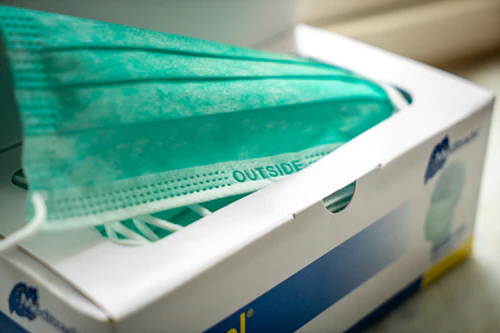“Pandemic: How To Prevent An Outbreak”
《流行病:如何预防流感大暴发》
By Rick Ellis
文/里克·埃利斯
When you are trying to decide the best time to release a TV series, it can be better to be lucky than smart. That certainly seems to be the case for Netflix, which released this new six-episode documentary about the dangers of pandemics the same week that China seems to be undergoing an outbreak of the Coronavirus. And if you’re looking for a complete guide to all of the horrors that might be headed our way, “Pandemic: How To Prevent An Out-break” is an entertaining and informative look at how viruses spread and the efforts being made around the globe to lessen the impacts of infectious disease.
选定电视剧首播的最佳时机,这恐怕更多靠运气,而不是精明。对于奈飞公司来说,情况绝对如此。该公司正巧赶上新型冠状病毒在中国暴发的同一周播出了这套有关流行病之危险的六集纪录片。假如你正在寻找一个完整的指南,以搞清在前方等着你的恐怖都有哪些,那么《流行病:如何预防流感大暴发》就是既好看又有信息含量的选择,你可以了解病毒的传播方式,以及全世界正在做哪些努力来降低传染病的影响。
Pandemic begins with a search in a suspected mass grave site in Butler County, Pennsylvania that contains victims of the 1918 Spanish Flu. In an era before air travel, that pandemic killed at least 50 million people worldwide and it’s the event that drives a lot of the relentless efforts of scientists to simultaneously work towards more effective vaccines and ways the spread of a mass outbreak can be slowed. One scientist warns that it’s only a matter of time until a new deadly pandemic surfaces and given the interconnected world we live in, a new outbreak could kill hundreds of millions of people.
《流行病》开篇伊始就探寻了位于美国宾夕法尼亚州巴特勒县一个怀疑是集体墓地的地方。那里埋葬了死于 1918 年西班牙流感的人。在航空旅行到来前的时代,这场流行病在全球范围内夺走了至少 5000 万人的生命。正是这场流行病驱使科学家们持续不断地努力,既要研发出更见效的疫苗,又要研究如何延缓传染病的大规模暴发。有位科学家警告说,出现一种新型的致命流行病只是时间问题,而考虑到我们生活在这个相互联通的世界,一旦传染病暴发就能杀死数以亿计的人口。
We tend to think of the flu as more of an inconvenience than anything else in the United States, although we know in the abstract that it can kill people. But the flu actually kills 700,000 people or so globally each year. Most of the deaths are preventable, if patients had access to the flu vaccine & quality healthcare that could intervene early enough in the illness to prevent a more severe outcome. And one strand of the stories interwoven in Pandemic is concerned with the issue of providing adequate healthcare. The urban hospital in India that generally doesn’t get patients from rural areas until they are near death. The small county hospital in Oklahoma that has a one doctor working 72-hours shifts and has been close to shutting down in recent years. Those stories are scary but probably aren’t a surprise, given the lack of health care resources in smaller communities.
我们往往认为,在美国,流感不过就是多点儿麻烦,虽然我们知道理论上它能要人命。但是,实际上流感每年都致使全球约 70 万人死亡。大多数的死亡病例是可以避免的,假如病人提前注射过流感疫苗或者有良好的医疗护理,能够在疾病早期进行干预,就能避免更严重的后果。贯穿《流行病》的主题之一,就是提供充足的医疗护理的问题。印度城市中的医院通常不接受乡下来的病人,除非他们已经濒临死亡。美国俄克拉何马州的小型县级医院里,一名医生工作 72 个小时才换班,而且近年来基本接近闭门关张的状态。鉴于小型社区医疗资源匮乏,这些故事虽然吓人,但可能并不令人意外。

But there are also plenty of warnings about what a mass outbreak would mean to large urban areas like greater New York City. One health care official notes that most hospitals in NYC are working at close to 100 percent capacity in a normal flu season. A pandemic would overwhelm the health care system within days. To say nothing of the impact an outbreak would have on everything from food supplies to burial services. In other words, no area is safe or comfortable in the midst of a widespread viral outbreak. So the most effective approach is to stop the spread of the virus before it becomes a major pandemic.
但是,对于大纽约市这样的大型城市区域传染病大暴发的后果,纪录片也给出了不少的警告。一位医疗官员提到,纽约市的大多数医院在正常的流感季节都将近 100% 全负荷运转。一旦传染病大暴发,会在数日之内击垮医疗体系。更不用提大暴发还会影响从食品供应到丧葬服务等的各行各业。换言之,一旦病毒大规模暴发,没有哪个区域会是安全舒适的。所以最有效的方法是,在大暴发之前就阻断病毒的传播。
Pandemic also introduces viewers to some of the scientists working towards the Holy Grail of viral immunology: a vaccine that would prevent transmissions of a wide range of viruses. This would not only make the current somewhat ineffective flu shots a thing of the past, it would also hopefully make it possible to prevent the next pandemic. The documentary follows one small bio start-up which is in the midst of animal trials on a possible universal vaccine. It appears to work, but requires a series of seven shots. The scientists struggle to bring down that number of required shots, while bootstrapping animal trials with their own money. At one point, they head to Guatemala to do tests on pigs, in hopes of getting results positive enough to allow them to move to human trials.
《流行病》还介绍观众认识了几位科学家,他们正在努力追寻病毒免疫学的圣杯:一 种能够阻断多种病毒传播的疫苗。如果成功,不仅能够结束目前的流感疫苗不够见效的历史,还很有希望预防下一次的流行病。纪录片跟踪了一个小型生物医药创业公司,该公司在研发一种通用疫苗,目前正进行动物实验。疫苗似乎有用,但需要连续注射七针。科研人员努力想把额定注射次数降下来,同时自掏腰包勉力进行动物实验。他们一度前往危地马拉,在猪身上做实验,以期得到足够积极的结果去申请进行人体实验的许可。
But mixed in with all the hard work and optimism is the growing movement of people unwilling for whatever reason to get vaccinated. From guerrillas in the Congo who are convinced an Ebola vaccine is actually giving people the disease to Oregon anti-vaxers who see requiring immunizations as a consent issue, a fear of traditional medicine is hampering efforts to slow the progress of the flu and other viral diseases. One Oregon mom says she believes her children don’t need to be vaccinated if they are simply given healthy foods and live a clean lifestyle. Hearing her talk about immunizations makes me wonder how these anti-vaccination supporters will respond during a pandemic in which health care workers are offering a preventive vaccine.
但是,在所有这些辛勤工作和乐观态度之外还存在不同意见:无论怎样都不愿意接受疫苗注射的人数在增多。刚果的游击队员坚信埃博拉疫苗其实才是造成人们患病的罪魁祸首,美国俄勒冈州的反疫苗者要求孩子接种疫苗必须家长同意,这些事例都说明对传统医学的恐惧正在妨碍那些减缓流感和其他病毒疾病传染速度的努力。俄勒冈州的一位妈妈说,她相信,只要她的孩子能吃到健康的食品、有着卫生的生活习惯,就不需要接种疫苗。听到她这么谈论疫苗接种,我不禁想知道如果传染病大暴发而医疗工作者研制出了预防性疫苗,这些反疫苗支持者将会如何反应?
That tension between science and emotion, hope and despair is ultimately what makes “Pandemic: How To Prevent An Outbreak” so compelling. It’s a complex issue and one that sits at the heart of a lot of arguments being made in 2020. What are our responsibilities as a society? Are we required to get immunizations for the greater good? Is it worth spending money in anticipation of a pandemic that might not take place for 50 or 100 years? After watching the series, I’m not sure I have the answers to those questions. But I definitely feel more qualified to know what I don’t know about pandemics.
科学与情感、希望与绝望之间的张力是使《流行病:如何预防流感大暴发》如此扣人心弦的终极原因。这是个复杂的问题,而且是 2020 年诸多讨论的核心问题。作为一个社会,我们的责任是什么?要求我们接种疫苗是为了更多人利益吗?为了预防一个可能在 50 年或者 100 年内都不会发生的流行病花费金钱是否值得?在看完这个系列纪录片之后,我不确定能回答这些问题。但我确实觉得自己能更好地了解那些我不知道的关于流行病的事。








